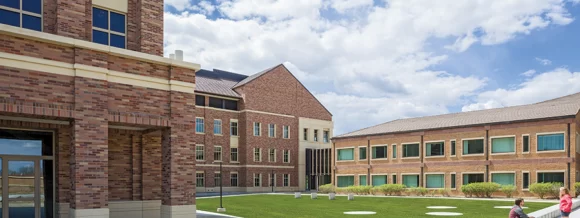
The Research Park (Sustainability, Energy, and Environment Community building and Sustainability, Energy, and Environment Laboratories). (Courtesy of the University of Colorado Boulder)
When COSMOS co-founder and team advisor Angel Hernandez moved to Boulder, he encountered an entirely different culture than what he grew up with. Originally from a predominantly Mexican neighborhood in Chicago, Hernandez transferred to be a part of the University of Colorado Boulder’s physics program.
“It was a huge culture shock for me,” he said. “No one really speaks Spanish here.”
As a transfer student and commuter, Hernandez said he felt unsupported by the university.
“I was left to the elements and trying to figure out how to maneuver my degree plan,” he said. “I have an evening exam at 7 p.m. on a Tuesday and I commute to school. I was like, who came up with this stuff?”
After the pandemic, Hernandez was approached by assistant physics professor Bethany Wilcox to revitalize the student group COSMOS.
COSMOS, which stands for Community of Support for Marginalized Students, works to diversify CU Boulder’s physics and astrophysical and planetary sciences departments.
COSMOS aims to create a community for students and connect them with peers and professionals in their fields.
“I wanted to make this environment better than what I had walked into,” Hernandez said.
Initially after the pandemic, COSMOS mostly served as a meeting place for students to connect.
“We were really focused on community development: getting students from underrepresented minority groups, getting them together and creating a safe space for everybody,” Hernandez said.
As the group grew, career development shifted to the forefront. COSMOS provides everything from professional and faculty mentorship to career panels and technical workshops for students.
COSMOS president Aaron Barrios emphasized the importance of giving students the opportunity to network.
“In science, it’s a lot like business sometimes where it’s not necessarily how much you can do or research you do or what things you can do, but who you know,” he said, “You have people around you but you also have people that look like you… seeing them there can empower you to go and seek out your own opportunities.”
Also a commuter student, Barrios was initially impressed by the accessibility of COSMOS when he joined in 2022.
“Just the meeting time alone was revolutionary to me,” he said. COSMOS event times vary with details available on the group’s website.
Most of all, Barrios said the sense of community was transformative for him.
“To have that setting to express our identity… I had not seen that before except at my own house,” Barrios said.
Sophomore and APS Liaison Elena Carlson was motivated to join as a woman in physics.
“There’s not a lot of representation and I don’t have a lot of girls in my class. So it can be really scary trying to make friends in the class,” she said, “It was just such a welcoming environment and it felt like a very safe space to talk to people and get advice about classes and research, how to get involved and all of that.”
Recently, COSMOS attended an undergraduate research expo on Saturday, April 20 in the University Memorial Center. The event included a poster session and an address from Nobel laureate and professor adjoint of physics, Eric Cornell.
“I think [COSMOS] will offer up a lot of opportunities for students, especially those from under-represented communities,” Barrios said.
Contact CU Independent Staff Writer Greta Kerkhoff at Greta.Kerkhoff@colorado.edu.
